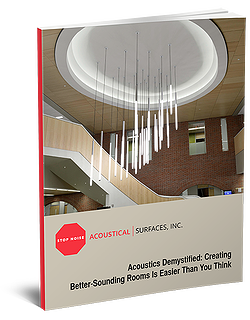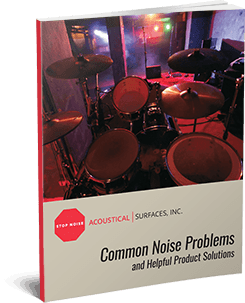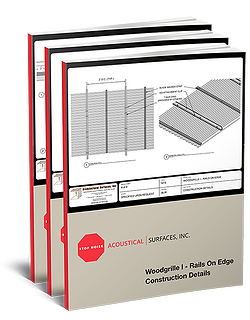Soundproofing Warehouses & Industrial Rooms – Making Heavy Machinery Quiet
Anyone who’s ever worked in a large plant or warehouse knows how loud they can get. You are working around all kinds of heavy machinery and moving parts that the hard floors and solid building shell can amplify sounds to nuisance levels. It’s not ideal.
Not only are loud noises annoying enough to make people irritable and less able to focus, but regular exposure to sounds above 85 decibels can also significantly damage your hearing. Industrial soundproofing is necessary to ensure the health and happiness of your employees. In order to develop an effective soundproofing plan, you need to know a little bit about what causes the high noise levels in your workplace, as well as how to control them.
The Importance of Industrial Soundproofing
At the risk of overstating the obvious, factories and plants can and do get loud. Not many other types of workplaces deal with a combination of heavy machinery and numerous employees in enclosed spaces the way an industrial plant does. If the space isn’t treated, the sounds and vibrations can quickly overwhelm your workforce in ways you may not have expected.
Keep Your Staff Safe
First and foremost, we soundproof industrial plants to keep everyone who works inside safe from the effects of sound on their physical and mental health. This should be a big driver in the decision to implement soundproofing solutions.
Regular exposure to loud noises can increase stress and lower concentration in the short term. These are the essential ingredients for workplace accidents. Keeping your staff calm and focused will positively impact their emotional and physical well-being.
If the noises your staff is exposed to are exceptionally loud or persist for a very long time, they can do physical damage as well. Hearing loss is a common complaint amongst those who have worked in industrial settings for decades. Limiting the volume of the noise in your workplace will limit the amount of damage done to your employees’ hearing.
It’s the Law
Noise pollution is a very real issue affecting the modern world. Sound waves can do so much damage. We actually need to mitigate it by law. According to an OSHA estimate, 22 million workers per year are exposed to noise levels that have the potential to cause damage.
If noise levels are at or above an average of 85 decibels over an eight hour work shift, you must implement a hearing conservation program. If your employees need to shout to be heard, it’s too loud. The easiest way to avoid issues is to reduce the volume of the noise.
If the building is in a residential area, you may actually face additional pressure to keep the noise down. Your neighbors will be unhappy if your third shift keeps them from getting a solid eight hours, and it’s never good to get into it with the neighbors. Keep everyone happy by investing in some industrial soundproofing.
What is industrial noise?
The machines we use every day to make our lives easier generate a lot of noise. From your car to your power tools to the conveyors and motors that move your work along, heavy machinery emits a lot of noise. Moving parts also produce vibrations, which create additional noise. In order to reduce the amount of noise in your plant rooms, it’s important to take care of the worst offenders.
Heavy machinery
The loudest culprits you are likely dealing with are the pieces of heavy machinery that make your business go. They provide employees with the tools they need to get the job done, but they also create a whole lot of noise. They are the main reason industrial building soundproofing is necessary and must be addressed.
The HVAC system
The heating and cooling systems in buildings can be large contributors to noise. The units that produce heat and air conditioning produce noise on their own. They also pass vibrations and air into the ductwork. The combination can raise the ambient noise levels in the room on a fairly consistent basis, especially in a large plant, since they run quite often in large spaces. Your HVAC system is a good place to focus some of your attention.
Conveyors
Another piece of common factory equipment that causes a considerable decibel rise is the conveyor. Conveyors take many forms, but all of them create noise in one way or another. Identifying which points in the system cause the most noise and applying commercial noise barriers is crucial to controlling the noise.
Another simple step that can keep your conveyors, as well as all your machinery, quiet is to keep them well maintained. As parts move, lubrication breaks down, and motors are forced to work harder—noise increases as a result. Keep them maintained, and keep them quiet.
The people
We can’t forget all those people on the floor. From their footsteps to the conversations with coworkers, people are a constant source of sound. While there isn’t really any way to keep productive people quiet, they are a source of sound that needs to be addressed.
How to reduce noise pollution in factories
A noisy workplace doesn’t lend itself to efficiency or comfort. Since excessive exposure to noise and vibrations can have numerous negative health effects and lower concentration levels, leading to fatigue and errors, industrial soundproofing is essential to keeping things on track. There are many solutions to help reduce negative health effects from exessive noise exposure such as egg crate foam, fabric wrapped acoustic panels, sound absorbing curtains, and more.
Isolate noisy machinery
The most obvious solution to nuisance noise may be to quiet your noisiest machines. Many pieces of industrial machinery can be hidden inside enclosures constructed with sound absorbing materials. Since they are built for industrial use, they are made to withstand heat, so you can find a safe solution for nearly any piece that is causing you headaches.
You can isolate noisy machinery by methods as simple as surrounding them with industrial soundproof curtains, and you can go so far as to construct a permanent enclosure to keep them quiet. The choice depends largely on the amount of noise control needed and how often and easily you will need to access the machinery.
Isolate vibrations
Aside from the noise they create, heavy pieces of machinery usually generate vibrations as well, which means another source of sounds and another potential hazard. If the vibrations are particularly violent, you’ve got more issues than simple sound attenuation products can fix. For the sake of this article, we will assume your machinery produces vibrations less apt to causing physical harm.
One of the most effective methods of vibration isolation is through the use of isolation pads. These get laid below the piece of machinery and absorb the vibrations before they can reach the floor. When machines vibrate on the floor, they create an additional source of noise and pass vibrations across the floor and into your employees. This isn’t comfortable or healthy. It’s an important problem to tackle.
The same concept applies to anything that vibrates and causes noise. Pipes and HVAC ductwork vibrate as well. You can isolate these vibrations with special hangers that keep the vibrations from reaching the trusses and spreading to the surrounding structure.
Treat the room itself
When the space you’re working in is acoustically treated, the noise levels inside will noticeably decrease. No matter what type of machinery or workforce you’re working with, this is one of the most important steps.
By placing soft, absorbent materials against the walls of the space, many of the sound waves inside will be absorbed rather than reflected, which will help reduce echoes and reverberation. Reverberation occurs when sound waves continually bounce off hard surfaces, and there are many of those in plant rooms, making them louder and more persistent. The sound deadening materials on your walls will trap sound waves rather than reflecting them, preventing reverb from getting out of control.
Treating the walls can also help prevent sound transmission between the busy shift indoors and the neighborhood on the other side. Preventing noise pollution in the neighborhood will go a long way toward generating a good relationship between your business and the people who live near it.
If the space is rented, you may be hesitant to spend the money modifying a space that isn’t yours. If you’d prefer not to install industrial soundproof panels directly to the walls, another option is to suspend acoustic panels from the ceiling. In many cases, this will actually give you the biggest bang for your buck. Even sounds that are reflected can be caught before they make their way across the expanse of the space.
Acoustically treating the room is the best blanket solution to your noise problem. The machinery is stationary, but the workers may not be. By improving the acoustical properties of the room, you can mitigate some sound from all sources.
How do you improve the sound in your space?
Each space is unique, and some solutions will work better than others in any particular space. Your best bet is to consult with professionals. Someone with experience can help you identify where your noise is coming from and how to keep it from becoming a nuisance. Industrial soundproofing can be tricky if you don’t know what you’re doing. And anything worth doing is worth doing right.



